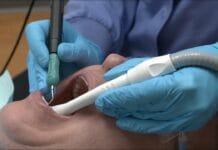Dear patients with dental insurance,
There is no easy way to say this. So I’ll just be straight with you. Your insurance company is not in the business of improving or maintaining your oral health. They are in the business of making money. Though there is a running joke about how much dental care costs and how dentists are making a fortune off patients ‒ buying new cars and even yachts ‒ the truth is your dental insurance company is making all the profits with little to no regard for your needs.
If I had a dollar for every time I’ve heard a patient say, “I only want to do what my insurance covers,” I could buy my own yacht. The truth is your insurance has no idea what you need. That is the job of your dentist, dental hygienist, and the rest of your dental team to determine.
How many times has your dental carrier looked in your mouth? Have they done any kind of evaluation to determine your needs? I’m confident the answer to both those questions is a resounding no. As you can imagine, it is practically impossible to assess one’s oral health without, at minimum, looking into the patient’s mouth, but ideally, acquiring radiographs (often not covered by certain insurance plans) as well as caries risk assessment and comprehensive periodontal exams that can determine the existence and/or extent of an individual patient’s needs.
Dental Insurance: Struggling to Keep the Lights On
Dental insurance has based its coverage on what an average healthy patient would need. A healthy mouth would be void of any disease characteristics such as inflammation, bleeding gums, bone loss, and essentially any form of periodontal disease ranging from gingivitis to mild, moderate, or severe periodontitis. This is not tailored coverage that will coincide with the tailored care you will receive at your dental practice of choice.
Here is an interesting statistic to consider: Dental insurance coverage has not changed since the 1970s. For instance, in 1975, the maximum payout was between $1,000 to $2,000 a year, which is exactly the same today. Additionally, dental insurance works somewhat backward from medical insurance. With medical insurance, you have a maximum out-of-pocket before your insurance takes over, covering any further fees at a certain rate. Dental insurance pays a maximum out of their pocket then the remaining fees are your responsibility. That maximum mentioned above is one of the things that hasn’t changed in over 40 years.
Dental insurance coverage in no way reflects inflation over the 40-plus years. Could you imagine still paying 1970s gas prices today? Service stations would go out of business left and right. Therefore, your cost after what your insurance covers can be steep. This is not your dentist trying to take advantage of you. This is your dentist trying to keep the lights on at a dental office and pay employees a living wage.
I’m going to break down how dental insurance works further. If your dentist is a provider for your plan, they have a contract to follow the insurance company’s fee schedule ‒ not their own fee schedule they have put in place for their private practice. This means that off the very top, your dentist is discounting anywhere from 30% to 50% of their actual treatment fee.
The Misleading ‘Free Cleaning’
I want to also touch on the “free cleanings” everyone thinks they are entitled to with insurance coverage. Again, this coverage is based on an average healthy individual. “Free cleanings” are equivalent to your yearly physical exam and check-up with your medical doctor. It is preventive, and that’s why it’s “free” to you. Preventing disease is cheaper for your insurance provider than treating disease.
In other words, providing this service at no cost to you is your insurance provider’s way of encouraging you to take them up on their offer to have a yearly physical exam to save money in the long run. The same concept applies to what your “free cleaning” is; it’s preventing disease, not treating it.
If you happen to have periodontal disease and need treatment, your insurance will likely only pay a portion of that. Many patients want to forgo the periodontal treatment because their insurance doesn’t cover it at 100% as they do for preventive treatment. However, legally and ethically, your hygienist and dentist cannot provide you with your “free cleaning” because you are no longer classified as a healthy patient and you have a chronic disease.
When you are diagnosed with periodontal disease, hygienists could be fined or even lose their licenses if they provide “free cleaning” instead of providing you with the standard of care, which is nonsurgical periodontal therapy. Further, the health impact of ignoring a disease that is linked to other systemic diseases could be detrimental and cause long-lasting effects on the patient’s quality of life.
Understand Your Dental Insurance
As the carrier of the insurance, it is imperative that you understand your coverage. If your dental office files your insurance for you, it is a courtesy. They don’t have to do that. Instead, your dental office could require you to pay the full price, and then you would have to file the claim and be reimbursed.
Further, your dental office did not choose which insurance carrier or plan you even have. I like to disclose this because, too many times, patients blame the dental office for their insurance not covering a procedure. It is not your dental office’s responsibility to manage your coverage, but most do it anyway as a courtesy.
If you are a patient with dental insurance, I want to encourage you to consider it a discount plan rather than a plan designed to cover all your needs. If they cover a portion of the cost, yay! If not, just know you are still getting a discount if the procedure is covered in your plan because the dentist must honor the insurance companies’ fees, not their own.
Back to my original point, your average dental practice’s total yearly revenue (single-doctor private practice) ranges from $200,000 to $1 million. In contrast, Delta Dental’s revenue for 2021 was $7.9 billion! The CEO of Delta Dental Plan of Michigan made $14,842,204 in 2021. The average dentist’s salary is around $250,000 a year.
If you really want to know who is profiting from your dental care, look no further than your dental insurance company.
Please understand your insurance does not cover all your needs, and your dental team is not trying to take advantage of you. We want what is best for you and your oral health. Dentists, dental hygienists, and the rest of the dental team has your best interest at heart. Please don’t treat dental professionals poorly because your insurance company doesn’t value your oral health. Take that up with the insurance carrier.
You can reach out to your insurance company through the information provided on your insurance card. Additionally, if you feel your insurance company has discriminated against you on the grounds of sex, age, or ethnicity, you can file a report with the U.S. Department of Health and Human Services, Office for Civil Rights. You can submit a form on their website if you feel you have experienced any form of discrimination.
Sincerely,
An exhausted, verbally abused dental hygienist who cares more about your oral health than your dental insurance company ever will.
Before you leave, check out the Today’s RDH self-study CE courses. All courses are peer-reviewed and non-sponsored to focus solely on high-quality education. Click here now.











